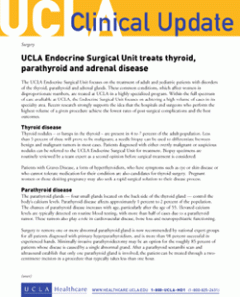Referring Physicians - Surgical Unit Focus
Find your care
We deliver effective, minimally invasive treatments in a caring environment. Call to connect with an expert in endocrine surgery.
UCLA Endocrine Surgical Unit treats thyroid, parathyroid and adrenal disease
The UCLA Endocrine Surgical Unit focuses on the treatment of adult and pediatric patients with disorders of the thyroid, parathyroid and adrenal glands.
These common conditions, which affect women in disproportionate numbers, are treated at UCLA in a highly specialized program. Within the full spectrum of care available at UCLA, the Endocrine Surgical Unit focuses on achieving a high volume of cases in its specialty area. Recent research strongly supports the idea that the hospitals and surgeons who perform the highest volume of a given procedure achieve the lowest rates of post surgical complications and the best outcomes.
Thyroid disease
Thyroid nodules – or lumps in the thyroid – are present in 4 to 7 percent of the adult population. Less than 5 percent of these will prove to be malignant; a needle biopsy can be used to differentiate between benign and malignant tumors in most cases. Patients diagnosed with either overtly malignant or suspicious nodules can be referred to the UCLA Endocrine Surgical Unit for treatment. Biopsy specimens are routinely reviewed by a team expert as a second opinion before surgical treatment is considered.
Patients with Graves Disease, a form of hyperthyroidism, who have symptoms such as eye or skin disease or who cannot tolerate medication for their condition are also candidates for thyroid surgery. Pregnant women or those desiring pregnancy may also seek a rapid surgical solution to their disease process.
Parathyroid disease
The parathyroid glands — four small glands located on the back side of the thyroid gland — control the body’s calcium levels. Parathyroid disease affects approximately 1 percent to 2 percent of the population. The chances of parathyroid disease increases with age, particularly after the age of 55. Elevated calcium levels are typically detected on routine blood testing, with more than half of cases due to a parathyroid tumor. These tumors also play a role in cardiovascular disease, bone loss and neuropsychiatric functioning.
Surgery to remove one or more abnormal parathyroid gland is now recommended by national expert groups for all patients diagnosed with primary hyperparathyroidism, and is more than 98 percent successful in experienced hands. Minimally invasive parathyroidectomy may be an option for the roughly 85 percent of patients whose disease is caused by a single abnormal grand. After a parathyroid sestamibi scan and ultrasound establish that only one parathyroid gland is involved, the patient can be treated through a twocentimeter incision in a procedure that typically takes less than one hour.
Adrenal disease
The two adrenal glands, located on top of the kidneys, make an array of hormones that includes glucocorticoids, mineralocorticoids, sex steroids, and adrenaline and related compounds. Patients with adrenal tumors may present with hypertension. A significant fraction of “essential” hypertension – currently estimated as approximately 3 percent of patients whose hypertension is without a recognized and correctable cause – may be due to hormonally active adrenal tumors, such as aldosterone-producing adenomas. Once identified, these patients can be treated and cured of their hypertension.
Pheochromocytoma is a tumor that releases adrenaline and other potent compounds that dangerously increase blood pressure. The recent discovery of new germline mutations causing pheochromocytoma has led to the finding that up to 25 percent of cases are part of a familial syndrome. UCLA screens all patient family members and offers genetic counseling in an effort to identify affected individuals before their health is threatened by advanced tumors.
Widespread use of CT (computed tomography) scanning has led to the increased detection of adrenal 'incidentalomas' — adrenal masses discovered during an imaging procedure performed for unrelated reasons. The National Institutes of Health (NIH) recommends that a battery of blood and urine tests for excessive hormone production be performed for all patients with incidentally discovered adrenal masses. These tests look for elevated levels of glucocorticoids, mineralocorticoids, and adrenaline and related compounds. Surgery is recommended for patients whose tests return positive results, and for patients with negative test results but with tumors greater than six centimeters. Patients with tumors greater than four centimeters should also be considered for surgery if they are otherwise in good health.
Most adrenal lesions can be treated laparoscopically in a procedure that lasts less than two hours and calls for only a 23-hour hospitalization. Laparoscopic surgery decreases pain and recovery time and has produced excellent results at UCLA.
Contact information
For more information, for consultation, or to refer a patient, call:
- Phone: Primary line for information and appointment scheduling
- Fax: 310-267-8632
Participating physicians
The Endocrine Surgical Unit at UCLA involves physicians from a number of specialties. The team members include: Michael Yeh, M.D. – Endocrine Surgery, Director Jianyu Rao, M.D. – Pathology and Laboratory Medicine Sharon Hirschowitz, M.D. – Pathology and Laboratory Medicine Nagesh Ragavendra, M.D. – Radiological Sciences/Ultrasound Jacqueline Casillas, M.D. – Pediatric Hematology/Oncology Christiaan Schiepers, M.D. – Molecular and Medical Pharmacology.
